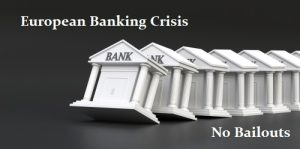How Will Europe Respond to Being the Source of the Crisis?
QUESTION: Dear Martin,
You have discussed the structural design flaw in the euro being due to the lack of consolidation of EU countries’ debt, as well as, EU policies that prohibit bank bailouts. Why could EU policies regarding the prohibition of bank bailouts just not be changed to allow for bailouts? If I understand correctly, wasn’t it also the case that the ECB was not legally allowed to buy EU country sovereign debt? That law was either changed or ignored (I’m not sure which) during the European sovereign debt crisis earlier this decade to allow for the ECB to buy sovereign bonds, which then brought down sovereign debt yields.
Correct?
Thank you for helping us all to grow in our understanding of what confronts us.
Sincerely,
WJ
ANSWER: Everything would function so much better if we had rational leadership. The problem is simply that government will NEVER avert a crisis. They must first experience the crisis before they will ever consider changing the policy. Yes, it seems easy to just fix the problem now. However, I can talk face-to-face until my face turns blue. They will NEVER prevent a crisis. Politicians know that they ONLY look authoritative when they respond to a crisis. Nobody will listen if they say they just prevent a crisis. People assume it is just BS.
Add to this reality the problem between domestic and international policy objectives. Politicians run for election, promising to do this or that, which all seems nice for it is presented to be within their power. That is what is under siege. The Federal Reserve has suddenly realized that it has become the central bank of the world. They were intending to lower rates to help emerging markets, Europe, and Japan. Then the Repo Crisis hit and the Fed was compelled to address the liquidity crisis. This was not about “stimulating” the economy, it was about preventing short-term interest rates from rising. In other words, the QE of 2008-2009 was about buying in long-term debt to try to lower long-term interest rates. Here the short-term rates were rising. Traditionally, the only thing a central bank can control is the short-term. The Repo Crisis exposed the fact that central banks are losing control of even the short-term.
Remember the inverted yield curve in the summer of 2019 that everyone said was a precursor to a recession? Ever since the Repo Crisis, the yield curve has steepened dramatically. This is confirming what I have been saying. This was never about stimulation, it was an attempt to prevent short-term rates from rising.
Therefore, the questions become: (1) Will Europe respond and realize that their no-bailout policy will create a worldwide banking contagion and crisis? (2) If they do recognize that they are the source of a worldwide crisis, how long will it take them to respond and reverse their policy? (3) Will they accept responsibility or blame the rest of the world?
Rational people respond completely differently than politicians who cannot publicly admit they were wrong.


